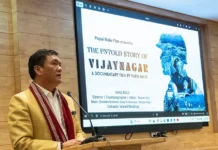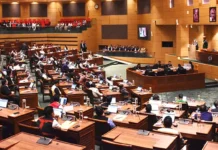TIANJIN, 31 Aug: Prime Minister Narendra Modi and Chinese President Xi Jinping on Sunday agreed to work towards a “fair, reasonable and mutually acceptable” solution to the India-China border issue and pledged to expand trade and investment ties, recognising the role of the two economies to stabilise global trade.
In their wide-ranging talks, the two leaders largely focused on boosting trade and investment ties, a move that came against the backdrop of disruptions in global trade triggered by US President Donald Trump’s sweeping tariffs, including a whopping 50 percent on Indian goods.
In the meeting held on the margins of the Shanghai Cooperation Organisation (SCO) summit, PM Modi underlined the importance of peace and tranquillity in the border areas for the continued development of India-China ties and said that New Delhi is committed to advancing the relations based on “mutual trust, respect, and sensitivity.”
The two leaders vowed to expand bilateral trade and investment ties, reduce trade deficit and agreed to expand common ground on bilateral, regional, and global issues and challenges like terrorism and fair trade in multilateral platforms, according to an Indian readout.
“Our cooperation is linked to the interests of 2.8 billion people of our two countries. This will also pave the way for the welfare of all humanity,” Modi said in Hindi in his televised opening remarks.
Modi and Jinping recognised the role of the two economies to stabilise world trade and underlined the need to proceed from a political and strategic direction to expand bilateral trade and investment ties and reduce trade deficit, the Ministry of External Affairs (MEA) said in the readout.
“The prime minister noted that India and China both pursue strategic autonomy, and their relations should not be seen through a third country lens,” it said.
“The two leaders deemed it necessary to expand common ground on bilateral, regional, and global issues and challenges, like terrorism and fair trade in multilateral platforms,” it added.
In a social media post, Modi described his talks with Jinping as “fruitful.”
“We reviewed the positive momentum in India-China relations since our last meeting in Kazan. We agreed on the importance of maintaining peace and tranquillity in border areas and reaffirmed our commitment to cooperation based on mutual respect, mutual interest and mutual sensitivity,” he said.
In the last few months, both sides have initiated a series of measures to reset their ties that came under severe strain following the deadly clashes between Indian and Chinese troops in Galwan Valley in June 2020.
Modi, who landed in China last evening after a gap of seven years, said in the meeting that an atmosphere of peace and stability has been prevailing along the border since he and Jinping met in October last year in the Russian city of Kazan.
“Both leaders welcomed the positive momentum and steady progress in bilateral relations since their last meeting in Kazan in October. They reaffirmed that the two countries were development partners and not rivals, and that their differences should not turn into disputes,” the MEA said.
“A stable relationship and cooperation between India and China and their 2.8 billion peoples on the basis of mutual respect, mutual interest and mutual sensitivity are necessary for the growth and development of the two countries, as well as for a multipolar world and a multi-polar Asia befitting the trends of the 21st century,” it said.
It said the two leaders noted with satisfaction the successful disengagement of troops last year and the maintenance of peace and tranquillity along the border areas since then.
“They expressed commitment to a fair, reasonable, and mutually acceptable resolution of the boundary question, proceeding from the political perspective of their overall bilateral relations and the long-term interests of the two peoples,” it said.
“They recognised the important decisions taken by the two special representatives in their talks earlier this month, and agreed to further support their efforts,” it added.
Modi and Jinping also noted the need to strengthen people-to-people ties through direct flights and visa facilitation, building on the resumption of the Kailash Manasarovar Yatra and tourist visa.
“On economic and trade relations, they recognised the role of their two economies to stabilise world trade. They underlined the need to proceed from a political and strategic direction to expand bilateral trade and investment ties and reduce trade deficit,” the MEA said.
Modi also expressed support for China’s presidency of the SCO and the summit in Tianjin.
He also invited Jinping to the BRICS summit that India will be hosting in 2026.
President Jinping thanked Modi for the invitation and offered China’s support to India’s BRICS presidency, according to the MEA.
Modi also had a meeting with Cai Qi, member of the Standing Committee of the Politburo of the Communist Party of China.
The prime minister shared with Qi his vision for bilateral relations and sought his support to realise the vision of the two leaders, the MEA said.
“Qi reiterated the Chinese side’s desire to expand bilateral exchanges and further improve relations in line with the consensus reached between the two leaders,” it said. (PTI)




